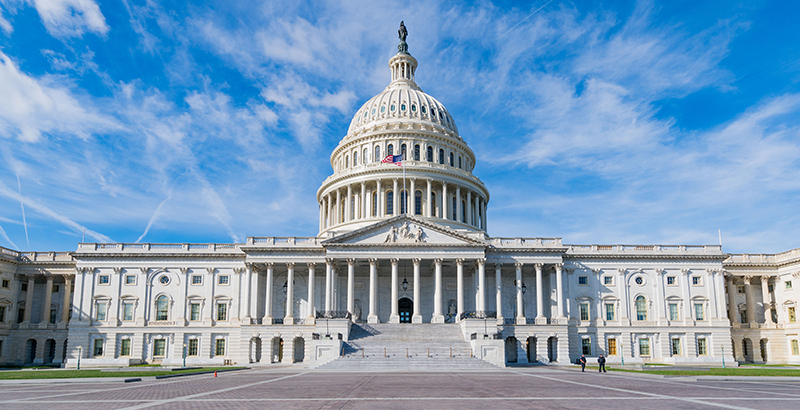A compromise Education Department spending bill, the first year-long funding bill for the department to be passed in nearly a decade, is speeding toward final passage ahead of a Sept. 30 deadline.
By a vote of 93-7, the Senate on Tuesday passed the bill, a compromise between the two chambers that also funds the Labor and Health and Human Services departments and is coupled with a Defense Department funding measure.
The House is expected to consider the measure when it returns from recess next week, though conservatives may try to split the Labor, Health and Human Services, and Education portion from the part funding the Defense Department to get more leverage in negotiations, Politico reported.
The Education Department for the past decade has been funded through a series of continuing resolutions and omnibus funding measures that appropriate money for several federal departments.
The bill overall provides $70.9 billion for the department, a slight decrease from last year after lawmakers cut some previously authorized funding for Pell Grants. Excluding Pell Grants, Education Department programs would receive a little shy of $49 billion, a $581 million increase.
Major K-12 funding programs, like Title I grants for low-income students and grants for students with disabilities, saw small increases, each under 1 percent. States will get $15.9 billion for Title I and $13.2 billion under the Individuals with Disabilities Education Act.
Among the biggest increases was a 10 percent boost to funding for homeless students, who numbered about 1.2 million in the 2014-15 school year, the most recent for which federal data is available. The programs would get $94 million next year.
Here are five more things to know about the bill:
1 Lawmakers offer another increase for school safety.
After a huge boost in school safety spending in the most recent omnibus spending bill, appropriations committee members again plan to hike spending on school safety.
The bill would provide $95 million for “school safety national activities,” $5 million more than last year, and $1.2 billion for Title IV grants that can be used for a wide variety of purposes, including counselors and violence prevention.
The measure didn’t, however, include any guidance on whether Title IV grants can be used to arm teachers, a source of much controversy in Congress after the New York Times reported last month that Education Secretary Betsy DeVos was considering allowing it.
The Trump Administration, in its budget request released before the Parkland, Florida, shooting in February, had proposed $43 million for school safety national activities and ending the Title IV grants program. DeVos later said the proposal to eliminate Title IV grants should be revisited.
2 Charter schools are again a major winner.
The conference committee agreed to $440 million for charter schools, an increase of $40 million. That 10 percent increase is one of the largest of any Education Department program in the bill, and it follows several years of substantial gains for the federal charter school program even when overall education funding was cut.
Nina Rees, president and CEO of the National Alliance for Public Charter Schools, in a statement praised the “record-high funding level” for the program.
“While the new funding levels for the [charter school program] will help serve more students, the need for charter school funding is enormous. We look forward to the day when all parent demand is met with access to a high-quality public school,” she said in a statement.
The Trump Administration has repeatedly requested $500 million for the program, which aids start-up and expansion costs for charter schools.
The members’ report recommends setting aside $7.5 million to establish or expand charters in “underserved, high-poverty, rural areas.”
3 Congress again ignores the administration’s requests for cuts, private school choice.
The Trump Administration made waves in its fiscal 2018 budget proposal with requests to eliminate funding for long-standing grants covering everything from teacher training and salaries (known as Title II) to afterschool programs to programs for Native Hawaiian and Alaskan students.
Not only did they not cut many of the programs the Trump administration sought to eliminate, but lawmakers put more money into several of them, including afterschool programs, which will get a $10 million increase to $1.2 billion, and the Special Olympics, which will get $18 million, up $2 million from the current year.
Members also again ignored DeVos’s request for a $1 billion pilot voucher program. Concerns about civil rights protections for students with disabilities and LGBT students not being observed in private schools receiving taxpayer money have been the focus of much of congressional Democrats’ debates with DeVos about her school choice budget proposals for the last two years.
4 Changes on desegregation, school facility study stand.
The Education Department funding bill approved by the House earlier this summer eliminated long-standing prohibitions on using federal funding for school integration efforts, and the Senate’s version required a Government Accountability Office study on the state of America’s aging public school infrastructure. Both changes ended up in the compromise version.
5 Congress expressed skepticism on department reorganization.
Members expressed “concerns” that stakeholder views are not being taken into account in a plan to reorganize the Education Department bureaucracy.
“In particular, the conferees recognize the value of the Office of English Language Acquisition and the Office of Career, Technical and Adult Education (OCTAE) and are concerned that the elimination or consolidation of either office will undermine the ability of the department to fulfill not only its mission, but also congressional directives to implement relevant programs and purposes,” the conferees wrote.
The conference report goes so far as to remind the department that the Office of Career, Technical and Adult Education is expressly authorized in federal law, and any changes would have to be approved by Congress.
Help fund stories like this. Donate now!


;)
